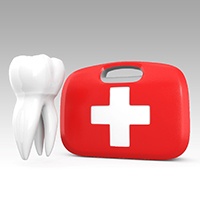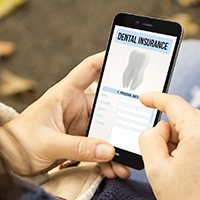
Emergency Dentistry – St. Albans, VT
Reliable Care from Experienced Professionals
In the case of a dental emergency, time is always of the essence. An hour or two could mean the difference between keeping or losing a tooth, which is why at St. Albans Dental, we always move our schedule around to see emergency patients as quickly as we can. If you or a loved one is dealing with a terrible toothache or has just sustained a dental injury, give us a call, and we’ll work to schedule an appointment and provide the relief you need as soon as possible with emergency dentistry in St. Albans.
Why Choose St. Albans Dental for Emergency Dentistry?
- Experienced Team of 3 Dentists
- Emergency Patients Seen Promptly
- We Accept Dental Insurance
How We Handle Dental Emergencies

- Call Our Office: The first step you should always take if you find yourself experiencing dental-related pain or damage is to contact our team at St. Albans Dental. We’ll provide you with helpful over-the-phone first aid guidance and schedule an appointment for you as soon as possible.
- Come in for an Examination: When you arrive at our office, our team will collect your patient information and take you back to one of our operatories. If necessary, we will capture X-rays of your mouth. One of our experienced dentists will examine the symptoms in question or painful area and diagnose the issue at hand.
- Get Treated: Once a diagnosis is made, your emergency dentist in St. Albans will create a treatment plan to get your smile back on the right track. Our front desk staff will also provide you with a detailed cost estimate and factor in any relevant insurance coverage so you understand your out-of-pocket expenses. Depending on the treatment necessary, we may be able to complete the procedure in the same visit, or we may schedule an appointment for a near-future date.
The Most Common Dental Emergencies
Ideally, any dental emergency should only be handled by professionals, so be sure to give our dental office a call if someone is experiencing extreme dental pain. However, if you’re unable to reach us immediately, there are a few things you can do to help with pain and increase the chances we’ll be able to save a tooth.
Understanding the Cost of Dental Emergencies

Once we’ve carefully examined your mouth, determined the root of the problem, and have come up with a potential treatment plan, we can start discussing the cost of your treatment. We’ll never push you towards unnecessary services that you’re uncomfortable with; our goal is to stop your pain while making sure that you’re confident that you understand what we’re recommending and why.
Every Emergency is Different

The emergency visit itself has its own cost, and its relatively inexpensive; it’s mainly meant to assess the damage and figure out what kind of treatment you’ll need. As for the ultimate cost of emergency care, we can’t give you a generalized estimate before we’ve examined you. There are so many different kinds of dental emergencies and no one single treatment that can address all of them. As such, your treatment plan may be as simple as having a crown or a filling placed, or it may involve a tooth extraction. While we’re explaining our findings, we’ll make sure you understand the costs involved so that there are no unwelcome surprises moving forward.
Saving Money with Proactive Care

Avoiding dental emergencies altogether is the best way to keep the costs of emergency care down. Of course, you can’t guarantee that an accident won’t occur, but you can take simple steps like brushing and flossing on a daily basis to protect yourself from tooth decay, gum disease, and other oral health problems that could potentially cost hundreds if not thousands of dollars in the long term.
When a real dental problem does occur, call our office right away. Ignoring a toothache, a fractured tooth, or other oral health issues is never the right answer. The problem will only grow worse as time goes on, and the cost of treating it will grow the more severe it becomes. Root canal therapy can save an infected tooth, but if it’s not performed in time, we might have no choice but to remove it and replace it. Maintain your health and your bank account by taking the initiative when something goes wrong.
Does Dental Insurance Cover Dental Emergencies?

Most dental plans include coverage for one emergency examination per year. As for the treatment, the benefits you receive can vary from plan to plan. You can expect the most common emergency services associated with hurting or damaged teeth (such as crowns and root canals) to be covered by your dental plan, but you should still call your insurance company first to confirm. Our team can go over your benefits with you and help you figure out the best way to maximize them.
Other Options for Making Emergency Dentistry More Affordable

If you don’t have insurance, you might want to apply for CareCredit financing. You select a payment plan that divides the cost into a series of installments, and little to no interest is involved. This can take a lot of the financial stress off of your emergency care.
Keys to Preventing Dental Emergencies

The last thing you want is for your day to be completely derailed by a dental injury, like a knocked-out tooth, right? We have some good news for you: you can protect your teeth and gums from serious harm with a few simple best practices! To learn what they are, read on!
Wear a Mouthguard When You Play Sports

It goes without saying that you need to wear a mouthguard if you play football, basketball, or another contact sport. You should also wear one while skateboarding, rollerblading, and surfing. That way, your teeth are protected from unexpected impact.
We also recommend wearing a nightguard if you grind or clench your teeth while you sleep. This small device will play a big role in preventing premature wear and tear.
Don’t Chew on Hard Items, Like Ice Cubes

Smoking is often the first thing people think of when they are asked about bad habits they should avoid. However, that’s just one of the many things that can lead to dental damage. Even seemingly harmless things, like chewing on ice cubes, biting your nails, and using your teeth to remove plastic wrapping can lead to serious harm, like a large crack in your enamel. So, it’s important to break bad habits like these ASAP.
Brush and Floss Consistently

The best way to prevent tooth decay and periodontal disease is by committing to a solid at-home oral hygiene regimen. That starts with brushing your teeth each morning and night for a full two minutes. You should also floss and rinse with mouthwash each day; this will help prevent plaque build-up, inflammation, bad breath, and countless other issues.
Get Regular Dental Checkups and Teeth Cleanings

Unless instructed otherwise, you should get a dental checkup and teeth cleaning twice a year. These routine appointments ensure that oral health problems, like cavities, are treated as conservatively as possible. Plus, an oral cancer screening is conducted at each visit, and harmful substances, like plaque and tartar, are removed during the cleaning to keep your smile happy and healthy between visits.
Eat a Healthy, Well-Balanced Diet

It’s no secret that sugar is one of the leading causes of tooth decay. That’s why patients are encouraged to keep their consumption of foods and drinks with added sugar to a minimum. Instead, it’s best to focus on getting all of the nutrients, vitamins, and minerals you need into your diet. These are largely found in fresh fruits and vegetables, so that’s a great place to start!
Dental Emergency FAQs
Should I go to the ER or emergency dentist?
Making the decision of whether to go to your ER or emergency dentist in the midst of a crisis can seem impossible, especially if this is your first time dealing with one. Although the ER may seem like the best choice initially, that’s not always the case unless you’re handling an issue that’s life threatening, like a fractured or broken jaw, difficulty breathing or swallowing, or a deep facial laceration that requires stitches. Otherwise, your emergency dentist in St. Albans is definitely your best bet. They can provide you with specialized care that prevents the issue from reoccurring. Plus, you’ll be less likely to be in a waiting room with people who are sick!
Will my toothache go away on its own?
As much as you may be wishing that your toothache or oral pain will disappear by itself, that’s often not the case. In fact, the longer you wait to get oral health emergencies treated, oftentimes, the worse they become. That’s why we recommend contacting our office as soon as possible so we can offer you over-the-phone guidance and pain-relieving tips. We’ll schedule an appointment for you to examine your mouth and diagnose and treat the situation so you won’t have to spend your entire day worrying.
How can I tell if my situation requires urgent dental attention?
The best way to tell if your oral health problem requires urgent attention from a dentist is if it’s causing you pain or discomfort. Oftentimes, this is your body letting you know that something serious is wrong, and it needs to be addressed immediately. You can also contact our office and let us know your symptoms, and we’ll let you know if it requires immediate care. Some of the most common dental emergencies we deal with are:
- Jaw pain
- Knocked-out teeth
- Broken or damaged restorations
- Chipped teeth
- Swollen and inflamed gums
How can I get rid of facial swelling?
If your face is swelling, it’s likely the result of dental trauma or a severe tooth infection. You can bring the swelling down by placing a cold compress on the area for 10 minutes, and then letting the area rest without the compress for 10 minutes, alternating these steps for up to an hour. If you’re in pain, you can also take over-the-counter pain relievers such as ibuprofen.
I Need a Checkup & Cleaning I am Concerned About Bleeding Gums I Have a Cavity or Broken Tooth I am Missing One or More Teeth I Want to Enhance My Smile View Our Services